
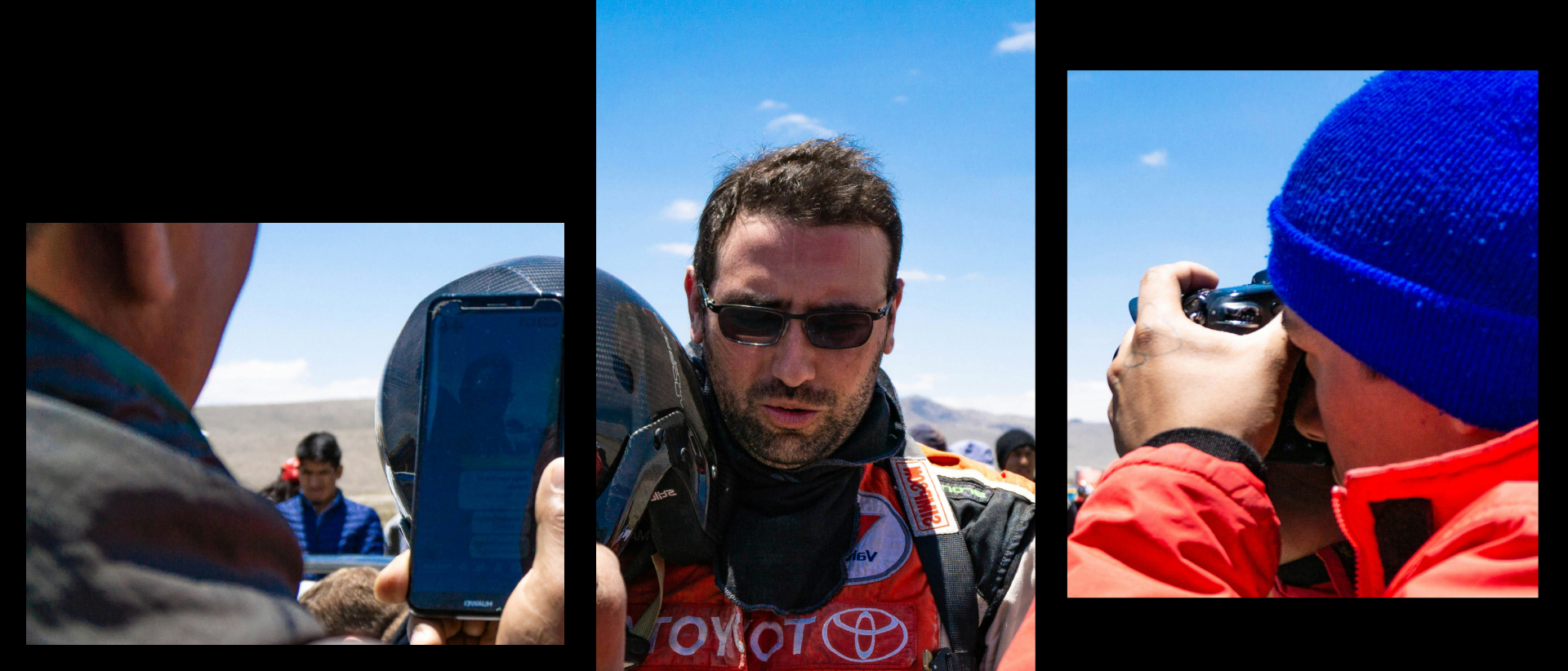
- An industry-first digital transformation
- Video and written word in one place
- A multi-platform solution across mobile and web
- A rigorous release schedule, at pace
- AWS, React, React Native and Wordpress
- A ‘one team’ approach with constant collaboration
One of the world’s most loved broadcasters, the BBC is truly global. Outside of the UK, it entertains over 300 million viewers. When it sought to rebuild and redesign BBC.com international, it needed a rock solid partner for a transformational collaboration.
It is the world’s oldest national broadcasters, and the world’s largest by number of employees – the BBC has been keeping us updated for over a century. It’s perhaps also one of the world’s most trusted broadcasters, earning its place in history with unbiased and trustworthy news we can count on spanning decades. Over 361 million of us tune in, log on, scroll and read the Beeb’s channels every month.
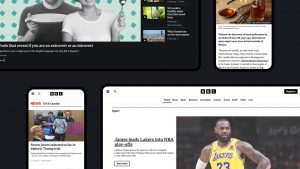
With humble beginnings as Britain’s public service broadcaster, the BBC expanded far beyond UK shores many moons ago. It was for this global audience outside of the UK, that the BBC sought to launch a one-of-a-kind digital experience that aggregated its content into one place. They needed a digital solution that streamlined both the user (and BBC staff) experience without the need for multiple apps. What the BBC needed was a full brand refresh, redesign and rebuild of BBC.com, outside of the UK. And a partner to do it with.
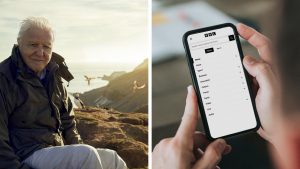
A bold vision
As the BBC is self-reliant outside of the UK (where it’s funded by the license fee), it needed to maximise revenue on a global scale. In years gone by it has relied upon advertising alone across disparate products, each valuable and market-leading in their own right but unconnected. In turn, data has been limited and difficult to harness to improve overall customer experience in line with competitors. The need for a consolidated service became clear. The BBC outside of the UK needed focus.
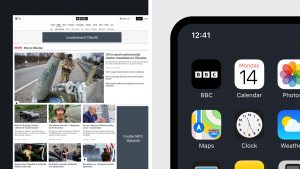
As Martina Fugazzotto, SVP, Product Strategy & Creative, says:
“There were many driving factors that led to relaunching the BBC product suite outside the UK, but our top priority was to create a more connected, contextual and frictionless experience for our ex-UK audience to interact with BBC content. The previous BBC.com experience had been built-up over time as an attempted mirror of the BBC UK experience, but with necessary omissions for things like content rights and necessary additions for things like advertising. When you take a strategic holistic package like BBC UK and start removing pieces here and there, then adding some new ones wherever they fit, you end up with something that doesn’t quite serve the audience or the business as well as it should. So we started over.”
That focus was to become the new BBC.com.
A vast undertaking
This would become the largest project UIC Digital has ever worked on, used by the largest number of people, with support needed from UIC Digital in every aspect; discovery, design, research, engineering, project management, QA and deployment. The BBC appointed UIC Digital after a rigorous and competitive selection process because of our design and development experience across multiple platforms, and our ability to combine this with full-stack capabilities.
With lots of unknowns, our work began with a three-month discovery phase running across 15 workshops with around 50 stakeholders. For this project specifically, we had to understand its priority requirements, key releases and major unknowns early on to get the team off to a rapid start and achieve an aggressive schedule. As a result, we produced a detailed SOW covering responsive web and native mobile apps, outlining all the must-haves across platforms, workstream approaches, features, assumptions and risks. Underneath this, technology architecture mapping showed a clear route forwards, matched against user experience.

We then used another series of workshops to address the risks and assumptions raised during discovery, defining what capabilities we might need to overcome them. We used research, investigation and prototype designs to validate our hypotheses and give guidance to future design and technology decisions contained in a robust roadmap. In the early stages of this, we created prototype concepts to help the BBC evaluate our direction and give feedback, pivoting quickly where needed.

An overhaul watched by the world
Once the overall direction had been signed off, the design team launched into a two-week sprint cadence, starting with the web and swiftly moving onto the mobile app. Under a collaborative ‘one team’ approach, a UIC Digital 37-person team worked hand-in-hand with stakeholders at the BBC to move rapidly along the planned timeline. At first on the project’s foundations, and then into the molecular detail of every single on-screen element. The sprint cadence kept releases on track, as we moved phase-by-phase throughout 2022, 2023 and into 2024 with constant consultation, iteration and adjustments to our approach based on feedback from user-testing with real-life users.
As Martina says: “One of my favorite anecdotes from our early website testing was when a tester told us they liked the new site because it had so much more content than before – when in actuality, we had exactly the same content offering, just reorganised and presented in a better way.”
The aim throughout was to build a scalable digital design system that grows alongside the project but can rapidly adapt with efficiency and speed. Of course, bringing it all together spanned many, many technical solutions and challenges but, by using AWS for the backend and using React and React Native for the frontend, we were able to problem solve and build fast. We used WordPress for the CMS too, with a Guttenburg extension to give editors a responsive preview function to see the content in situ – critical for saving time in a fast-paced news environment.
With BBC.com now live on the web and mobile apps, our 37-strong team continues to work night and day on delivering the final release. There is more to come in this transformational story. And for its 300M+ strong audience of viewers.
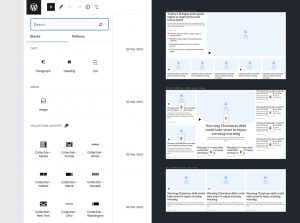
A relationship that lasts
One of the key challenges of this project was the need for speed against the sheer volume of stakeholders in an entity like the BBC. We had to set clear roles and responsibilities and keep teams free from working in silos to combat this, to great success. As does a conductor in an orchestra, we also needed to keep delivery, strategy and optimisation working in unison with one another, all headed in the same direction.
Another was the sheer scale of it. This had over 250 stakeholders involved, spanning continents from Europe to the USA. As such, its requirements were shifting all the time and we had to be ready to move on those. When you add in multiple devices and internal integrations, the parameters for change become hugely complex. Not to mention the very tight timeframe.
But the feedback so far has been more than positive. As the BBC said:
“Well, I’m proud of all of it, but the thing I consider a big accomplishment is something our website users will never see: it’s the way we’ve managed to evolve and reinvent our internal processes and structures that allowed us to build this new product. It’s actually more than just a website product launch.
“This is really a reimagining of the BBC experience as a whole for our presence outside the UK, and accomplishing that has meant bringing in new capabilities, new skill sets and experiences, and new ways of working across the organisation. Throughout this shift, our teams have been fantastic – they’ve been collaborative, flexible, motivated creative thinkers (and when I say “our teams”, I consider UIC Digital to be part of that).”
Together, we created a major website build from scratch, ingesting all BBC content over a new backend and CMS, within six months. That’s not just an incredible achievement for all involved – “transformational,” in fact, as declared by Timothy Douglas Davie CBE, Director General – but also testament to the long-standing relationship we have with the BBC, allowing for adopted workflows, strategies and structures that promote rapid development at pace.
Watch our UX Director Sam Drury and BBC Studios Creative Director Laura Llewellyn talk about the some of the details of the design process at Figma’s 2024 Config conference:

